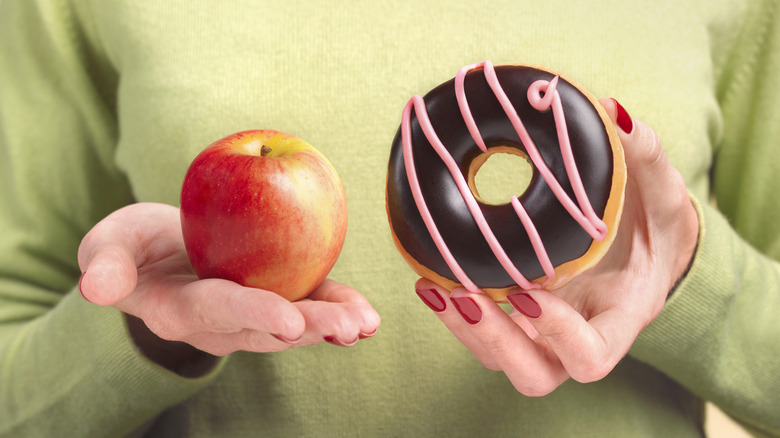The 2 Habits You Should Change After Turning 50 To Prevent Weight Gain
If your pants start feeling a little tighter as you slide from your 40s into your 50s, you're not alone. According to AARP, 70% of women gain weight as they transition through menopause. You begin losing muscle mass in your 30s, but you begin to lose it much more quickly as you age. That loss of muscle mass sinks your metabolism so that pizza you used to finish 20 years ago is more likely to show up on the scale in middle age.
Not only that, but for women, hormonal changes during menopause also means fat rapidly begins to accumulate around your belly. So even if you weigh the same as you did 10 years ago, the loss of muscle and gain of fat could mean an unhealthy change in body composition. With that extra fat putting pressure on your joints, you also might be feeling a little more fatigue or pain during your workouts, so you won't be burning as many exercise calories as you used to.
Although hormone therapy might help manage hot flashes and other symptoms of menopause, University of Chicago Medicine gynecologist Dr. Monica Christmas says it won't help you lose weight. Two habits to prevent or manage weight gain are exercising and re-evaluating your diet.
Dietary changes for people over 50
People who ordinarily eat healthy could also see a few extra pounds after turning 50 due to the shift in hormones and metabolism. If you normally eat 2,200 calories a day in your 40s, you'll need to cut at least 200 calories a day from that total in your 50s. That might require taking a close look at how many calories you're taking in now. Using an app like LoseIt! or MyFitnessPal could help you keep track.
Take note of your sweet tooth. With so many tasty, convenient snack foods out there, don't forget that many of them are high in sugar. Your body in your 50s can't handle those sugar spikes as well, which could lead to diabetes. That excess sugar in your diet can also mean more fat around your waist.
A 2023 study in the BMJ found that an added 100 grams of added sugar a day can lead to a two-pound weight gain every four years. You can almost cancel out that weight gain from sugar by adding 10 more grams of fiber to your diet. Rather than reach for refined grains, starchy vegetables, and sugary drinks, add more whole grains, fruits, and cruciferous vegetables to prevent weight gain. Men and women over 50 should avoid eating frozen pizzas and other processed foods to avoid gaining weight.
Exercise can stave off weight gain after 50
In your 20s and 30s, skipping a workout for happy hour might have been common practice. In your 40s, exercise can easily take a backseat to work demands or your child's soccer games. When you're 50, it's time to prioritize exercise. Exercise not only keeps you sharp as you age but also helps to manage your weight.
You don't need to join a CrossFit box when you put 50 candles on your birthday cake. You can start just by making a daily commitment to take a walk at least five days a week. The goal is to get at least 150 minutes of brisk walking or other moderate exercise a week. Moderate exercise means you're working hard enough that it's difficult to sing.
If you're already part of a running, walking, or cycling group, it's time to hit the weights to stave off age-related muscle loss. Your 50s is not too late for you to add more muscle, according to a 2011 meta-analysis in Medicine and Science in Sports and Exercise. Across 49 studies, men over 50 who participated in a weight training program added on average 2.4 pounds of lean body mass in 20 weeks.


